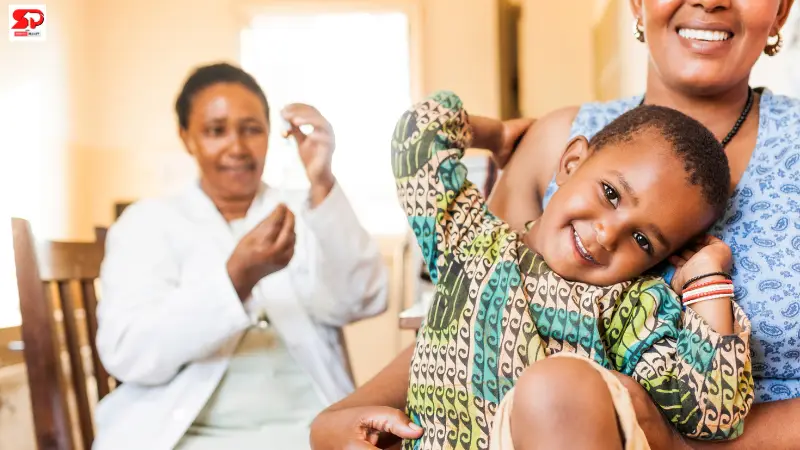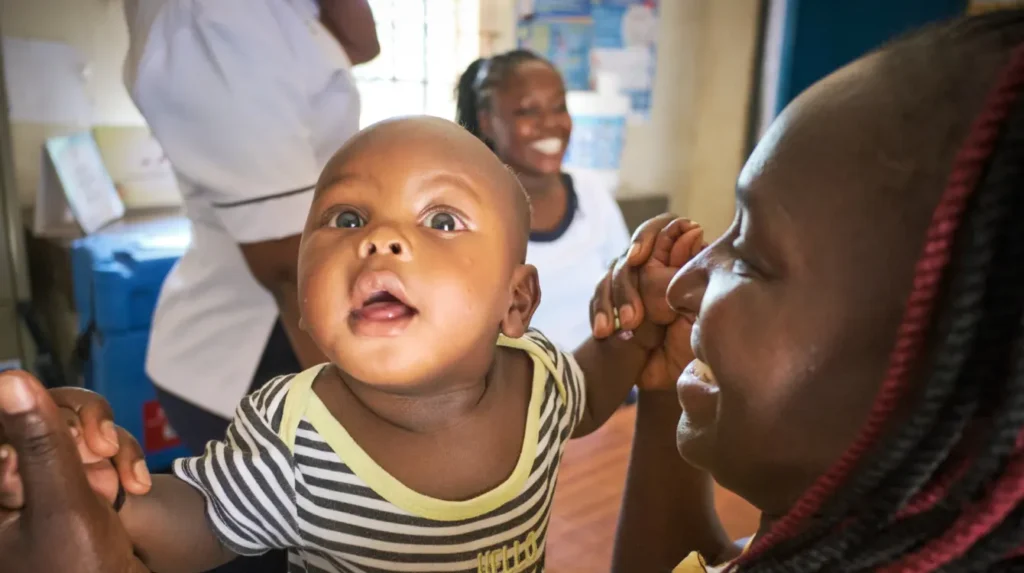For decades, malaria has cast a long shadow over Africa, claiming the lives of countless children each year. But a glimmer of hope has emerged from the heart of Cameroon, where the world’s first-ever malaria vaccine program for children has taken flight. This landmark initiative marks a pivotal moment in the global fight against this devastating disease, offering a ray of hope for a future where mosquito nets and insecticide sprays won’t be the only line of defense.
Malaria Vaccine: A Beacon in the Dark
Malaria, a mosquito-borne parasitic infection, continues to plague sub-Saharan Africa, with children under five bearing the brunt of its burden. In 2020 alone, the World Health Organization (WHO) estimates more than that 600,000 children under five succumbed to this preventable disease.
Traditional methods of malaria control, such as bed nets and insecticide spraying, have played a crucial role in reducing infection rates. However, the emergence of drug-resistant malaria parasites and the logistical challenges of implementing these interventions highlight the need for additional tools in the fight against this relentless foe.
Enter the malaria vaccine. While not a perfect solution, the Mosquirix vaccine, developed by GlaxoSmithKline, offers a glimmer of hope. Although only around 30% effective in preventing clinical malaria, it can significantly reduce the risk of severe illness, hospitalization, and death, particularly in young children. This translates to countless lives saved, families spared unimaginable heartache, and healthcare systems less burdened by this preventable disease.
Cameroon Takes the Lead
Cameroon’s decision to launch the world’s first routine malaria vaccine program for children is a bold and commendable step. The Central African nation aims to vaccinate around 250,000 children this year and next, a crucial initial step in assessing the vaccine’s real-world impact and paving the way for wider adoption across Africa.
This pioneering initiative is not without its challenges. The limited production capacity of Mosquirix, currently capped at 15 million doses annually, means reaching millions of vulnerable children will require additional support and collaboration. Moreover, ensuring equitable access within Cameroon and across Africa will necessitate robust delivery systems and targeted interventions.
Beyond Mosquirix: A Glimmer of a Brighter Future
While Mosquirix marks a significant milestone, it’s not the only weapon in the malaria-fighting arsenal. Another vaccine, developed by Oxford University and manufactured by the Serum Institute of India, offers several advantages, including lower cost, fewer doses, and potentially higher production capacity. With Gavi, the Vaccine Alliance, aiming to immunize over 6 million children with this vaccine by 2025, the future of malaria prevention appears brighter than ever.

IMPACT
Dr. Gregory Ganda, Kisumu County Executive for Health, acknowledged the limitations of previous malaria control methods, stating, “Whatever we were using before, we reached a point where the burden plateaued, and we needed an additional tool.” He highlighted the positive impact of the vaccine rollout, emphasizing,
“Since the vaccine was introduced in parts of Kenya, hospitalisations for children under 5 for severe malaria have fallen substantially, and there is a drop in child deaths.” Dr. Ganda further shared his personal experience, adding, “Over the past 3 years, we’ve witnessed a significant reduction in pediatric admissions from malaria. It’s a great feeling as a doctor when you are considering closing a ward because of lack of patients.”
Hope Beyond the Needle: A Holistic Approach
While vaccines offer a powerful tool in the fight against malaria, they are not a silver bullet. Continued investment in traditional control methods like bed nets and insecticide spraying remains critical. Additionally, strengthening healthcare systems, promoting community engagement, and addressing the underlying social and environmental determinants of malaria will be crucial for achieving long-term success.
A Deeper Dive into Cameroon’s Malaria Vaccine Program
Cameroon’s Pioneering Approach: Logistics and Challenges
Cameroon’s decision to launch the first routine malaria vaccine program for children comes with complex logistical challenges. Reaching every child in need requires a robust healthcare infrastructure, trained personnel, and effective cold chain management to ensure vaccine potency. The Ministry of Public Health in Cameroon, in collaboration with Gavi, WHO, and other partners, has developed a comprehensive strategy to address these challenges:
- Phased rollout: Recognizing the limited vaccine availability, the program adopts a phased approach, initially targeting regions with the highest malaria burden. This targeted approach allows for close monitoring and evaluation, informing future expansion.
- Community engagement: Mobilizing local communities through awareness campaigns and education programs is crucial for building trust and encouraging vaccine uptake. Traditional leaders, healthcare workers, and community influencers play key roles in dispelling myths and misconceptions surrounding the vaccine.
- Strengthening the health system: Investing in healthcare infrastructure, training additional healthcare personnel, and ensuring adequate vaccine supplies throughout the country are essential for the program’s success. Partnerships with international organizations and NGOs will be crucial in supporting these efforts.
Beyond the Numbers: The Human Impact
While statistics and data paint a picture of the malaria burden, the true impact of this disease is felt on a deeply personal level. In Cameroon, countless families have borne the brunt of malaria’s devastation, witnessing firsthand the toll it takes on children’s health, education, and overall well-being.
The introduction of the malaria vaccine offers a flicker of hope for these families. As cases dwindle and children are spared the debilitating effects of this disease, parents can envision a future where their children can thrive, free from the constant fear of malaria. The potential impact extends beyond individual families, contributing to stronger communities, a healthier workforce, and a more prosperous future for Cameroon.
The Road Ahead: A Collaborative Journey
Cameroon’s pioneering initiative paves the way for a broader fight against malaria across Africa. However, the journey towards a malaria-free continent requires the collective efforts of various stakeholders:
- National governments: Strengthening malaria control programs, investing in healthcare systems, and ensuring equitable access to vaccines are crucial commitments for African nations.
- International organizations: Gavi, WHO, and other international organizations play a vital role in providing financial and technical support, facilitating vaccine access, and coordinating research and development efforts.
- NGOs and community-based organizations: Local organizations hold immense power in mobilizing communities, providing education and promoting vaccine uptake, and ensuring the program caters to the specific needs of each region.
- Pharmaceutical companies: Continued research and development efforts aimed at improving existing vaccines and developing new, more effective ones remain crucial for long-term success.
A Beacon of Hope: A Vision for a Malaria-Free Future
While challenges lie ahead, Cameroon’s bold step serves as a powerful symbol of hope. With ongoing research, continued investment, and unwavering commitment from all stakeholders, the dream of a malaria-free Africa can become a reality. A future where children can play under the sun, unburdened by the threat of this deadly disease, where families can focus on building a brighter tomorrow, and where communities can thrive without the specter of malaria hanging over them.
Cameroon’s pioneering malaria vaccine program is not just a medical intervention; it represents a symbol of progress, a testament to human ingenuity, and a beacon of hope for a healthier future. As the world unites in this fight, the day may not be far when the buzzing of the mosquito no longer signifies dread, but simply the soundtrack to a vibrant, malaria-free continent.
Cameroon’s groundbreaking malaria vaccine program for children is a beacon of hope, not just for the nation but for the entire continent. It represents a crucial step forward in the long battle against this devastating disease, paving the way for a future where children can sleep soundly, free from the buzzing threat of the mosquito and the debilitating grip of malaria. As research and development continue, and access to existing vaccines expands, the dream of a malaria-free Africa may finally come within reach.
Remember, even small actions can make a difference in the fight against malaria. Together, we can build a future where no child succumbs to this preventable disease, and the promise of a healthier, brighter Africa shines through.

